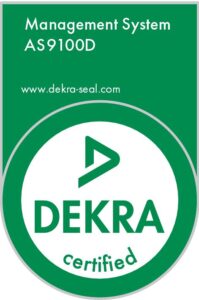Since the commencement of the aerospace industry, the demand for critical fasteners has increased accordingly. Manufacturers consider various factors when designing aircraft and spacecraft, with the most important being structural safety and longevity.
A variety of standard and specialty fasteners are used to assemble structural components in the aerospace sector. High quality and reliable aerospace fasteners contribute to the structural integrity and safe operation of aircraft and spacecraft. This article explores the importance of nuts and bolts in aerospace engineering.
The Significant Applications of Bolts and Nuts in the Aerospace Industry
Fasteners, such as nuts and bolts, are among the essential mechanical parts in aircraft, rotorcraft, and space vehicles. For instance, a commercial airplane can comprise of anywhere between one and three million fasteners. Aerospace fasteners join and secure different parts in primary and secondary structural areas. These include engines, fuselage, landing gear, propulsion systems, and wings.
These hardware devices help keep different components attached together. They also ensure aerospace components and mechanical systems offer efficient, safe, and durable performance.
Neglecting the critically of bolts and nuts can lead to catastrophic results in aerospace operations. You can picture an airplane engine detaching or a door coming loose during a flight due to poor industrial bolting. An incident reported by Airbus serves to highlight the importance of fasteners in aerospace operations.
In this case, a missing tie bolt in the landing gear assembly of an airplane caused damage to the wheel’s brake system. These events led to fluid leakage from the plane’s hydraulic system that triggered alarms during a flight. Fasteners such as tie bolts help maintain the structural integrity of landing gear and the overall safety of aircraft.
Aerospace engineers use nuts and bolts to create non-permanent joints. These are joints that you can dismantle or remove without damaging the joined parts. In this regard, the fasteners help make maintenance easier.
Maintenance is crucial in the aerospace sector to ensure the safety and reliability of operations. It also keeps crafts compliant with air safety standards and helps extend their service lifespan.
Aircraft and spacecraft contain numerous components that require periodical servicing and checks. Nuts and bolts enable maintenance personnel to easily and quickly dismantle, inspect, and replace faulty or worn-out parts.
Qualities Required for Aerospace Fasteners
The aerospace industry’s endless pursuit of safety, efficiency, and durability necessitates the development of reliable fasteners with enhanced mechanical properties. For this reason, aerospace companies source the highest quality products from a reputable fastener manufacturer. Below is an overview of important qualities necessary for bolts and nuts used in aerospace engineering.
High Strength
Aircraft and spacecraft are exposed to a high amount of pressure and stress during operation. Bolts and nuts used to assemble components must have high tensile and shear strength capable of withstanding significant loads. High fatigue strength is also crucial since aircraft commonly experience dynamic loads such as turbulence during service.
Thermal Resistance
Aircraft and spacecraft components often face extreme temperatures. This can lead to thermal failure.
Thermal resistance is critical for managing temperature variations in extreme conditions. High-temperature bolting is an important consideration for aerospace engineers to assemble aircraft and spacecraft that maintain optimal and safe performance during service.
Lightweight
Lightweight nuts and bolts are crucial for performance and efficiency in aerospace operations. Reducing structural weight is a major way to improve craft performance.
Lighter materials allow for a greater speed range and help reduce operational costs. A single fastener may not seem heavy. However, the millions of fasteners used in a single craft account for a significant amount of the craft’s weight.
Corrosion Resistance
In aerospace operations, engineers must mitigate various forms of corrosion. Corrosion can compromise the structural integrity and safety of craft components. Harsh service environments and changing atmospheric conditions continue to pose challenges in managing corrosion.
As such, aerospace fastener manufacturers must incorporate corrosion protection strategies into their production processes. Fortunately, improvements in material science and surface treatments enable manufacturers to produce durable fasteners to ensure the safety and success of aerospace operations.
Types of Bolts and Nuts Used in Aerospace Engineering
Regarding aerospace engineering, the tolerance for error is extremely small. As such, bolts and nuts used in these applications must adhere to the highest performance standards.
There are various types of bolts and nuts that the aerospace industry relies on. The most used bolts include:
Military Specifications Bolts
Manufacturers design close tolerance bolts with a greater emphasis on measurement accuracy compared to other types of bolts. They have a tolerance with an acceptable range of variance of +0.000, -0.0005 inch.
Close tolerance bolts eliminate the problem of loose-fitting bolts by matching specified sizes. Aerospace applications typically have sensitive fastening applications, making these precise bolts a necessity.
Army-Navy Bolts
Army-Navy (AN) bolts follow the Army-Navy specification, which is the predecessor to the Military Specification standard. This means they are stronger and more durable compared to ordinary bolts.
The AN specification requires threading to be pressed rather than cut. This construction results in strong threading that’s more resistant to breaking under heavy loads or vibrations. AN bolt also features a special coating that increases their corrosion resistance.
There are two main types of nuts that aerospace engineers utilize. They include:
- Self-locking Nuts – These nut types feature an in-built self-locking mechanism, such as a deforming elastic base. Aerospace engineers use locking nuts to protect components from loosening caused by constant vibrations.
- Non-locking Nuts – These types of nuts require additional external locking mechanisms to secure the joined components properly. The locking systems may include safety wires, cotter pins, and lock nuts.
Materials for Aerospace Fasteners
Due to the critical applications of fasteners in aerospace engineering, there are select materials that are ideal for the production of nuts and bolts. The material composition of these fasteners determines their characteristics, performance, and reliability. The materials used include:
- Aluminum – Preferred for its high strength-to-weight ratio, affordability, availability, and fatigue resistance.
- Steel – The strength of stainless and alloyed steel makes it ideal for bolts and nuts used on aircraft landing gear and surfaces.
- Titanium – Stronger and lighter than steel and has exceptional thermal resistance.
- Super Alloys – Manufacturers use high-performance alloys to produce fasteners capable of maintaining structural and surface integrity in extreme conditions. The most common superalloys employed in the aerospace sector include Hastelloy, Inconel 780, and A286.
Conclusion:
Aerospace fasteners, including bolts and nuts, have crucial functionality in aerospace operations. These pieces of hardware hold together the structural components of airplanes and spacecraft. Extreme operating conditions and strict performance standards necessitate the production of top quality products from capable fastener manufacturers.
This is where B&G Manufacturing comes in. For over 60 years, we have served the aerospace and defense industries by designing and supplying high-performance nuts and bolts that meet the most stringent industry standards. If you are looking for reliable fastener supplies near me, we are the company to turn to.
B&G Manufacturing is a specialist in the complex manufacture of standard and custom fasteners for critical applications. Our engineering expertise, industry experience, and commitment to offering best-in-class products make us a trusted partner across numerous markets worldwide. Feel free to explore our product catalog or contact us today to learn more about our offerings and services.


 Hatfield
Hatfield

